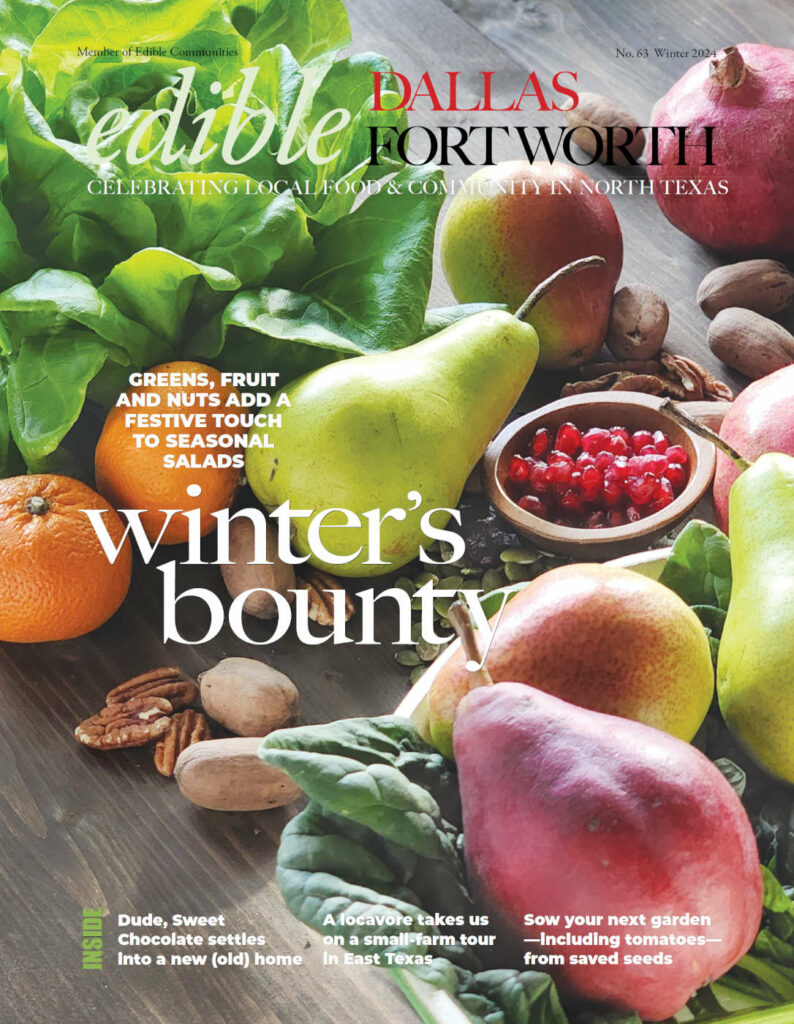Love Tolerate Coffee
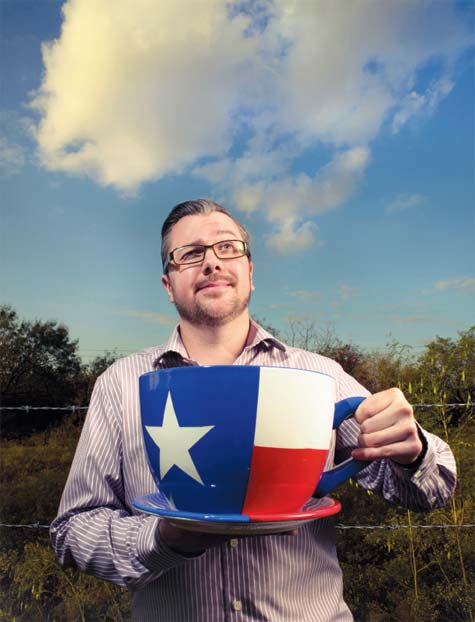
PHOTOGRAPHY BY DANNY FULGENCIO
I’ve never understood the appeal. The times I sampled coffee, all I tasted was hot and bitter. My face contorts, my teeth grit, and I involuntarily convulse. My distaste puts me in the minority opinion. It’s more than just a drink. I get that. Coffee’s a ritual, an emotional holistic experience. It’s the most traded commodity in the world, second only to oil.
I’m convinced I just haven’t had the right guidance and the ideal cup of coffee. So, over the course of a week, I met with coffee experts in Arlington, Dallas and Fort Worth to educate me on the coffee experience, to see if I could be converted. My education started, appropriately enough, with a school.
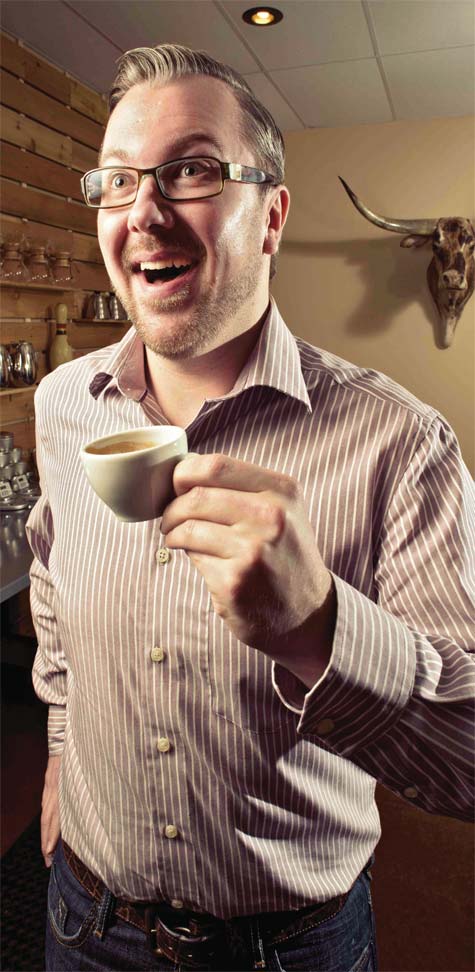
TEXAS COFFEE SCHOOL
The school hides behind a small strip mall in a south Arlington in an even smaller warehouse complex. I followed my nose to the Texas Coffee School; the soothing coffee aroma was apparent as soon as I stepped out of my car.
Tom Vincent, founder and director of the school, greeted me. He offers a wide variety of classes—for everyone from shop owners to baristas to home brewing enthusiasts. When Vincent discovered that I was not a coffee fan, he was intrigued by the challenge.
He brewed some coffee using a Clever Coffee Dripper. I learned that each brewing method—and there are many— brings out different aspects of your coffee. The Clever Dripper combines the features of a French press and the pour-over drip brewing method. The French press, also known as a coffee plunger, allows for full immersion brewing. Drip coffee makers come in both manual and automatic varieties. A well-calibrated drip coffee maker is not to be disparaged. This traditionally boring method can produce a very consistent cup of coffee.
Vincent handed me my first cup—a Finca Carmen Natural from Panama— and told me to slurp it. You can’t judge the coffee by the first or second sip. The coffee must first coat the tongue and acclimate your taste buds to the flavor. Sure enough, by the third sip I had a better sense for the coffee’s unique taste. It had an almost raspberry finish. Or at least, I offered that as a possibility and Vincent agreed.
It’s important to think about the coffee you’re drinking. Start by asking some simple questions: Do you like it or not? Was it sweet or sour? How was the finish? He stressed that there were no wrong answers. The important thing is to start thinking about your coffee.
OTHER IMPORTANT POINTS:
- For brewing coffee, your water should be between 195-205 F°. Water that’s boiling makes bitter coffee and burns your mouth.
- *Don’t use water that’s over-filtered. Coffee needs minerals in the water to make it better.
- High-quality coffee isn’t designed to need sugar or cream. At the very least, taste it first before deciding what it needs.
Vincent also noted that when you stop drinking soda, your palate improves. The sugar blast of soda throws off your ability to taste the subtleties in foods and drinks. As a recovering Coca-Cola addict, this wisdom made a lot of sense.
Vincent’s enthusiasm for coffee had me interested in exploring further. I drank two cups of coffee that morning, which is two more cups than I’d ever had before. Can someone who drank flavored high-fructose corn syrup for two decades really taste caramel notes, sharp accents and a nutty finish?
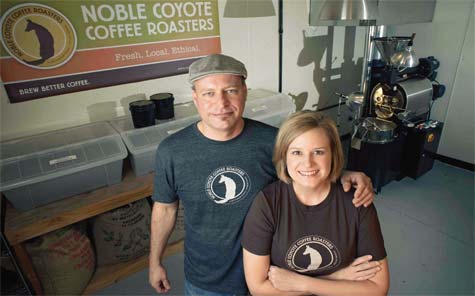 Kevin and Marta Sprague, Noble Coyote Coffee Roasters
Kevin and Marta Sprague, Noble Coyote Coffee Roasters
NOBLE COYOTE COFFEE ROASTERS
I decided to step further back into the process—to see how coffee gets selected, roasted and ready for mass consumption. I drove to East Dallas to another unassuming warehouse complex. There, Marta and Kevin Sprague, the owners of Noble Coyote Coffee Roasters, gave me a tour of their small, but inspiring operation.
Beaming with pride, Kevin showed me his roaster. It was smaller than I expected. The machine, which carries the hopes, dreams and financial fate of this couple, was no larger than the oven in my kitchen. Of course, the roaster is an oven. It rotates and evenly cooks the coffee beans. Kevin will carefully observe the beans throughout the process, sampling a few and examining the coloration. On a nearby dry-erase board, he charts the time and temperature to pinpoint when the beans are at their best.
Kevin’s place is in the kitchen, so to speak—while Marta handles the administrative end of the business. She takes the task of finding and ordering coffee seriously. All Noble Coyote’s coffee is either Fair Trade or Direct Trade and is grown using sustainable methods. Fair Trade means the coffee company uses a third party to regulate and inspect the farms, to confirm that the growers are appropriately compensated and treated well. Most coffee grows between the Tropic of Cancer and Tropic of Capricorn, the warm and humid middle of the Earth. Political stability isn’t a certainty in some of these regions, and it’s all too easy for the growers to be mistreated, receiving only pennies for their labor. Direct Trade means the coffee company has a one-on-one relationship with the grower. They visit the farm and buy straight from the source. Having no middleman allows the growers to get more money and eliminates the concern of corruption. As Noble Coyote expands, they dream of traveling to these farms and increasing the amount of Direct Trade they use.
Noble Coyote also prefers to use Shade Grown, meaning the coffee is grown under a canopy of trees. Instead of massive rows upon rows of coffee trees, this approach is more beneficial to the farm and farmer. It promotes a diverse ecosystem that also allows the farmer to grow other crops on his or her land.
Noble Coyote has no plans to open a shop. They don’t want to step away from what they enjoy best—working with the growers and roasting good coffee. You can order their coffee online. Part of the proceeds from their Café Momentum Blend goes to support Café Momentum, a restaurant initiative empowering at-risk youth.
OTHER IMPORTANT POINTS:
- Buy locally roasted coffee—to ensure that it wasn’t sitting in a distribution center for months.
- Check the bag for either FAIR TRADE or DIRECT TRADE labeling.
- Once you buy the coffee, keep it in the bag. The bag is designed to keep the coffee fresh. Air, light and heat are the enemies.
- Purchasing a grinder is also in your future. Don’t begrudge the grinder.
With a Chemex Brewer, Kevin made me a cup of their Rise n’ Grin coffee, ground from a blend of Fair Trade Arabica beans. Its flavor profile promised a coffee with tones of cocoa and citrus, floral and sweet.
A Chemex Brewer is an elegantly crafted, non-porous, borosilicate glass carafe. You use the special Chemex filters and pour the water in small circular motions over the grounds. The process requires a bit of finesse, but it looks cool. No sugar, no cream as Tom Vincent had instructed. But Marta brought donuts, and that didn’t seem like cheating.
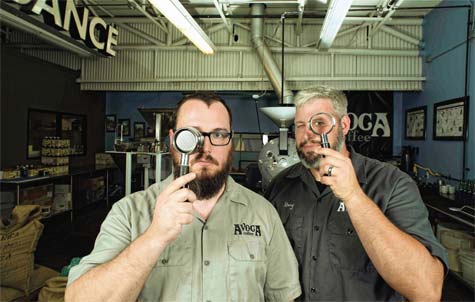 Garold LaRue and Jimmy Story
Garold LaRue and Jimmy Story
AVOCA COFFEE
The next day, I drove to Avoca Coffee in the Near Southside district of Fort Worth. It’s a popular roaster and coffee shop on West Magnolia Avenue. The parking lot was full. I walked up to the rust-colored front with large, proud signage overhead.
Close to the entryway, a glass wall reveals the roaster side of the operation. I waited in line and ordered a regular French press pot coffee. Taking Vincent’s advice again, I didn’t use any sugar or cream. I sat down at a small table, slurped once, slurped twice. I thought about my coffee. It tasted like coffee. No floral notes or earthy whatever. I felt a little frustrated with my inept palate. However, my face didn’t contort. For the first time in days, I was drinking coffee of my own free will without some expert observing my reaction. We’ll call that a win.
Jimmy Story, co-owner of Avoca, entered from the roaster side of the store. Story sat down and told me how he and Garold LaRue, his friend since 6th grade, got into the coffee business. Both Story and LaRue had been laid off from their jobs. They were having breakfast one day, and LaRue lamented how he missed roasting. His family had been in the coffee business for five generations, and he had inherited the passion for it. Story suggested they should just “go for it” and within 30 minutes of the conversation, they were with a realtor looking at a place.
Avoca has been open for two years. And if today is any indication, business is good. I glanced around the room and saw people with laptops sitting on leather couches and at small tables. Other people read books or talked with a friend. All of them had a cup of coffee nearby.
Too much has been made of coffee as a caffeine buzz to kick you in the head before starting the day. At Avoca, no one was in a rush. Good coffee should slow you down and serve as a reminder of simple pleasures. I thought about the long journey the coffee beans had taken from soil to picking to roasting to brewing. I drank the rest of my coffee, searching for that elusive nuance. The finish… it’s a bit… chocolatey?
RECIPE
DAVID HOPKINS is a freelance writer — a regular contributor to D Magazine, Smart Pop and The Two Man Game. He has also written comic books and graphic novels in a variety of genres. For twelve years, he taught English and Creative Writing at Martin High School where he served as a writing coach for interscholastic competitions. David lives in Arlington, Texas with his wife April, daughter Kennedy, and his dog Berkeley.
- David Hopkinshttps://www.edibledfw.com/author/dhopkins/


